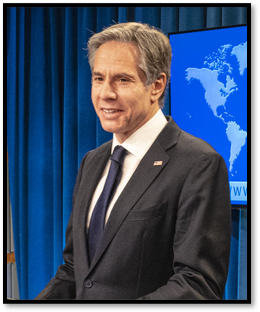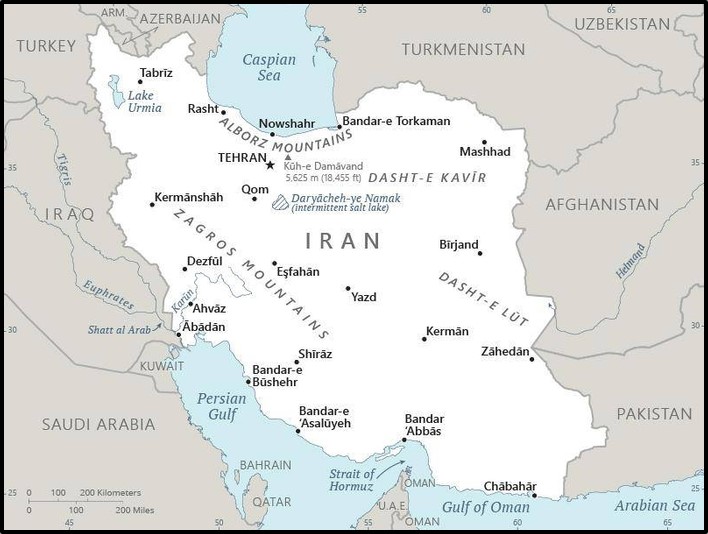Iran’s human rights record was extremely poor in 2022, particularly after nationwide protests erupted in September after the death in detention of Mahsa Amini, the State Department reported. Security, judicial, and political officials carried out unlawful killings and arbitrary detentions, conducted torture, restricted expression and religious freedom, recruited child soldiers for regional conflicts, and persecuted women and minority ethnic groups, among other offenses.

The Islamic Republic “took few steps to identify, investigate, prosecute, and punish officials who committed human rights abuses, including protester deaths and abuse in custody, or corruption,” the 2022 Country Report on Human Rights Practices said. “Impunity remained pervasive throughout all levels of the government and security forces.”
Secretary of State Antony Blinken noted that human rights conditions were backsliding around the world. In Iran, the government has “killed hundreds of peaceful protesters, including dozens of children, and have arbitrarily detained thousands” since protests began, he said. “The international community has come together to condemn and confront Iran's brutal crackdown and will continue to act in support of the right of the Iranian people to speak out for their fundamental freedoms.” The following is the executive summary of the Iran country report.
2022 Country Reports on Human Rights Practices: Iran
The Islamic Republic of Iran is an authoritarian theocratic republic with a Shia Islamic political system based on velayat-e faqih (guardianship of the jurist). Shia clergy – most notably the rahbar (supreme leader) – and political leaders vetted by the clergy dominate key power structures. The supreme leader is the head of state and holds constitutional authority over the judiciary, government-run media, and other key institutions. Ayatollah Ali Khamenei has held the position since 1989. The Assembly of Experts selects and may dismiss the supreme leader. Although assembly members are nominally directly elected in popular elections, the supreme leader has indirect influence over the assembly’s membership via the Guardian Council’s vetting of candidates and control over the election process. The supreme leader appoints half of the 12-member Guardian Council, while the head of the judiciary (who is appointed by the supreme leader) appoints the other half. The supreme leader also has indirect influence over the legislative and executive branches of government. The Guardian Council vets candidates for the presidential and Islamic Consultative Assembly (parliament/majles) elections, routinely disqualifying a significant number of candidates based on political or other considerations and controls the election process. Neither the 2021 presidential elections nor the 2020 parliamentary elections were considered free and fair.
 The supreme leader holds ultimate authority over all security agencies. The Ministry of Intelligence and Security and law enforcement forces under the Interior Ministry, which report to the president, and the Islamic Revolutionary Guard Corps, which reports to the supreme leader, share responsibility for law enforcement and maintaining order. The Basij, a nationwide volunteer paramilitary group, sometimes acts as an auxiliary law enforcement unit subordinate to the Revolutionary Guard. The Revolutionary Guard and the national army (Artesh) provide external security. Civilian authorities maintained effective control over the security forces. There were reports that members of the security forces committed numerous abuses throughout the year.
The supreme leader holds ultimate authority over all security agencies. The Ministry of Intelligence and Security and law enforcement forces under the Interior Ministry, which report to the president, and the Islamic Revolutionary Guard Corps, which reports to the supreme leader, share responsibility for law enforcement and maintaining order. The Basij, a nationwide volunteer paramilitary group, sometimes acts as an auxiliary law enforcement unit subordinate to the Revolutionary Guard. The Revolutionary Guard and the national army (Artesh) provide external security. Civilian authorities maintained effective control over the security forces. There were reports that members of the security forces committed numerous abuses throughout the year.
Iran experienced widespread unrest during the year. Multiple nationwide protests began after the September 16 death of Mahsa (Jina) Amini in the custody of morality police after she allegedly violated mandatory veiling laws, and security forces used lethal force against protesters. Women and youth led the protests, chanting “Women, Life, Freedom” and “Death to the Dictator.” By the end of the year, security forces killed more than 500 persons, including at least 69 children, and arrested more than 19,000 protesters, including children, according to the nongovernmental organization Human Rights Activists News Agency. Some of those arrested faced the death penalty, including children. The government also routinely disrupted access to the internet and communications applications to prevent the free flow of information and to attempt to interrupt or diminish participation in protests.
Significant human rights issues included credible reports of: unlawful or arbitrary killings by the government and its agents, most commonly executions for crimes not meeting the international legal standard of “most serious crimes” or for crimes committed by juvenile offenders, as well as after trials without fair trial guarantees; forced disappearance attributed to the government and its agents; torture or other cruel, inhuman, or degrading treatment or punishment by the government and its agents; arbitrary arrest or detention; harsh and life-threatening prison conditions; political prisoners and detainees; transnational repression against individuals in another country, including killings, kidnappings, or violence; serious problems with the independence of the judiciary, particularly the revolutionary courts; arbitrary and unlawful interference with privacy; punishment of family members for offenses allegedly committed by an individual; serious abuses in a conflict, including enabling abuses by terrorist groups throughout the region, the Syrian government, pro-Iran Iraqi militia groups, and Yemeni Houthi rebels, all of which were credibly accused of abuses (see the Country Reports on Human Rights Practices for Syria, Iraq, and Yemen), as well as unlawful recruitment or use of child soldiers in Syria, Iraq, and Yemen; severe restrictions on freedom of expression, including violence, threats of violence, and unjustified arrests and prosecutions against journalists, censorship, and enforcement of criminal libel and slander laws; serious restrictions on internet freedom; substantial interference with the freedom of peaceful assembly and freedom of association; severe restrictions on religious freedom; inability of citizens to change their government peacefully through free and fair elections; serious and unreasonable restrictions on political participation; serious government corruption; serious government restrictions on or harassment of domestic or international human rights organizations; lack of meaningful investigation of and accountability for gender-based violence, including domestic or intimate partner violence, sexual violence, workplace violence, child, early and forced marriage, female genital mutilation/cutting, femicide, and other forms of such violence; violence against ethnic minorities, including Kurdish and Baluch minorities; crimes, violence, or threats of violence motivated by antisemitism; trafficking in persons; crimes involving violence or threats of violence targeting lesbian, gay, bisexual, transgender, queer, and intersex persons; criminalization of consensual same-sex sexual conduct between adults, and enforcement of such laws; significant restrictions on workers’ freedom of association; and the worst forms of child labor.
The government took few steps to identify, investigate, prosecute, and punish officials who committed human rights abuses, including protester deaths and abuse in custody, or corruption. Impunity remained pervasive throughout all levels of the government and security forces.
Click here for the full Iran report.
